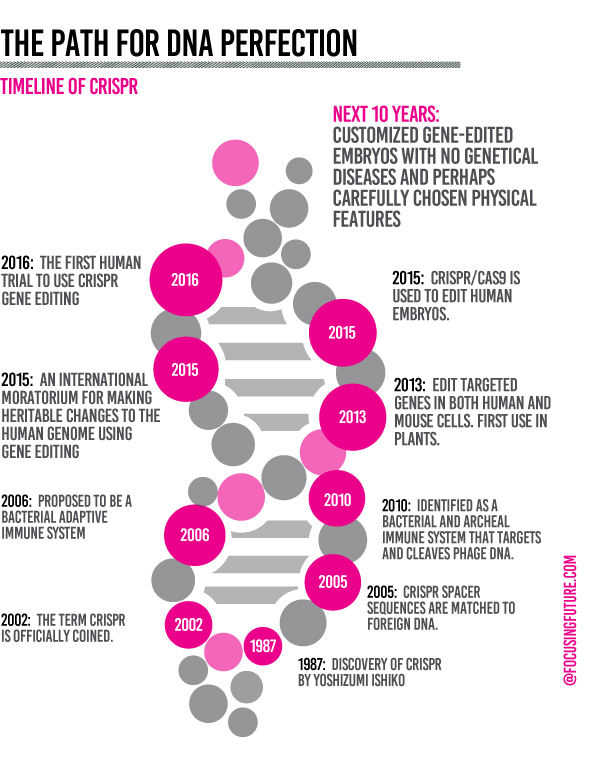![]() 4 minute read
4 minute read
Perhaps reversed aging and genetically modified humans sound like science-fiction, but through the gene editing tool CRISPR, it could all become a reality sooner than you think. With this revolutionary tool, it might be possible for us to overcome our human limitations, to cure cancer, genetic diseases and to live longer and healthier lives.
Eradicating diseases
CRISPR (Clustered Regularly Interspaced Short Palindromic Repeat) is a new type of gene editing that is inspired by a mechanism shown by a bacterium which has altered its own DNA to protect itself from a virus. According to the Wired magazine, it was in 2012 experts managed to use the CRISPR method when performing modifications to human and animal DNA. The process involves the enzyme CAS9 which searches for the needed piece of DNA and then allows scientists to make changes to this specific DNA to create gene modifications. CRISPR is very accurate and is not at all expensive, but there are, however, downsides to it. For instance, the bacteria used in the process could cause problems for the immune system.
In China, the method has already been tested on a living human being. In October 2016, a team scientists from Sichuan University led by oncologist Lu You, edited cells with CRISPR to make them more successful at identifying and eradicating cancer cells. After the alteration, the cells were cultured for their numbers to multiply, before being inserted back into the cancer patient. This method is still in its first stage, but in the future, it could have a significant impact on cancer and other diseases, for instance, Huntington’s disease. Not only Chinese scientist have started to use CRISPR on humans, but American scientists with Carl June from the University of Pennsylvania as an advisor, plan to use the method in treating different kinds of cancer on a real patient this spring.
Modified Babies
The gene editing of a human embryo is another ongoing concept of CRISPR. With the technology, a specific gene can be targeted in a single-cell embryo and changed to obtain changes for the future baby. This remains a challenge for the future since experts now mostly focus on adult cells and animal embryos which are not quite the same as human embryos. A team of researchers in China lead by Junjiu Huang, a gene-function researcher at Sun Yat-sen University in Guangzhou, tried implementing the gene editing on non-viable human embryos but discovered that it was too soon for this kind of experiments since only an insignificant part of the embryos contained the edited genes in the end.
The benefit of gene editing in embryos is that genetic diseases could be eradicated and not passed on to future generations, which would result in an overall healthier population. However, these kinds of experiments raise many ethical questions. Skeptics argue that the modified genes will be transferred to the offspring and no one can know for sure what the impact of these could be in the future. Moreover, it could be the starting point of unethical changes in the DNA, like choosing specific physical traits.

Society that
never gets old
Our genes hold the information on how fast we age and which disorders we are most likely to catch when growing old. According to Dr. George Church, a developer of CRISPR methods, CRISPR can stop or even reverse the aging process. He explains theoretically that aged cells can be modified and then turned into new cells again. He also mentions that in the future it could be possible for scientists to compare different person’s genes to see how they can be edited to resemble a person with longer lifespans genes. Dr. Church has already succeeded in reversing aging in human cells with the CRISPR tool, and he stresses that we could expect to have human trials for reversed aging in less than two years. The development can be interpreted as people not only will be healthier, but they will also remain younger for a longer period of their lives. Dr. Church states that the progress of CRISPR when it comes to aging could solve the big problem of an aging population in need of constant care.




